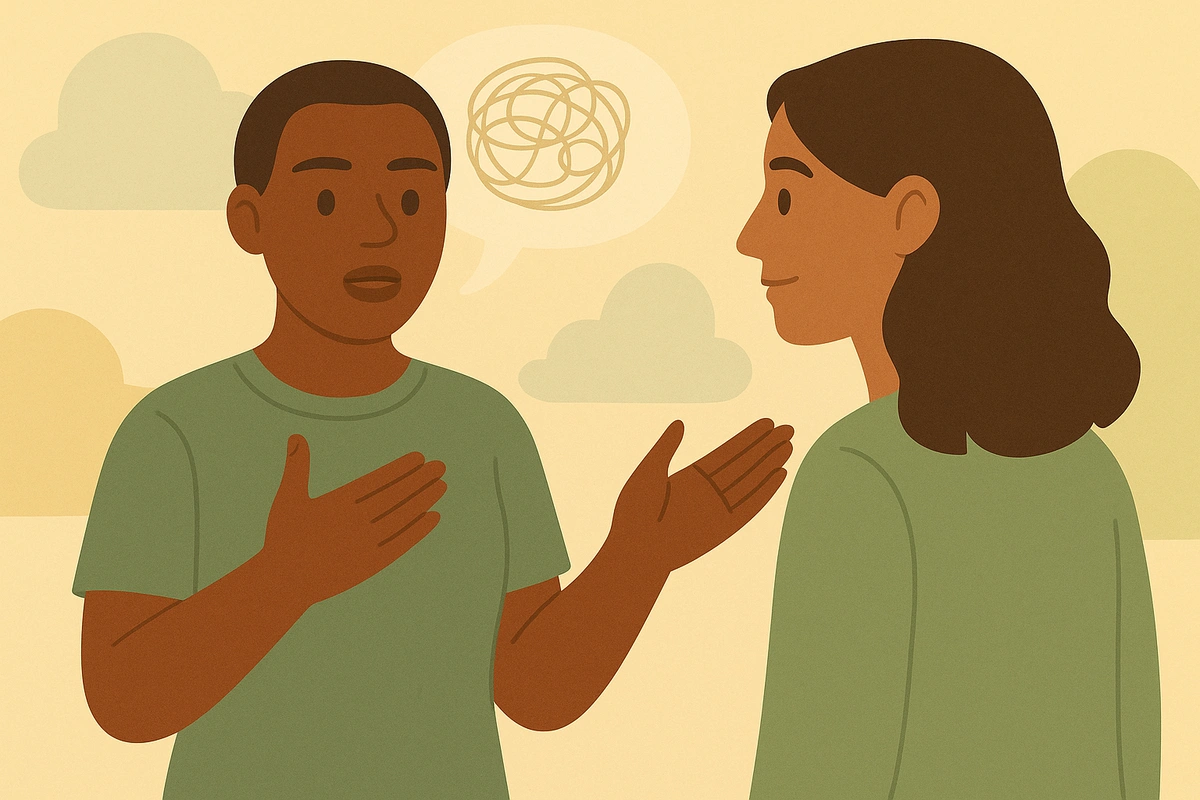Opening up about anxiety to your partner transforms fear and isolation into understanding and connection, creating a foundation of trust that strengthens relationships and supports both partners' emotional well-being. This vulnerable conversation becomes a bridge to deeper intimacy and more effective mutual support.

Sharing your anxiety experience with your partner involves honestly describing your thoughts, feelings, and symptoms while explaining how anxiety affects your daily life and relationship. This open communication reduces the isolation that anxiety creates and helps your partner understand how to provide meaningful support.
Your anxiety doesn't have to be a secret burden that separates you from the people you love most. When you communicate openly about your inner experiences, you give your partner the opportunity to truly understand and support you, while also modeling vulnerability that can deepen emotional intimacy. Research shows that couples who discuss mental health challenges together experience stronger relationships and better individual outcomes than those who struggle in silence.
Communicating about anxiety works by transforming a private, isolating experience into a shared understanding that strengthens relational bonds. When you openly discuss your anxiety, you activate what psychologists call "social support mechanisms" - the network of understanding and assistance that emerges when people know how to help you effectively.
Anxiety thrives in secrecy and isolation, often leading to what researchers describe as "emotional suppression" - the exhausting process of hiding your true feelings from others. This suppression increases stress hormones like cortisol and can damage both your mental health and relationship quality. Open communication breaks this cycle by reducing the cognitive load of keeping secrets and allowing your authentic self to be seen and accepted.
When your partner understands your anxiety, they can respond with empathy rather than confusion or frustration. This creates what attachment theorists call a "secure base" - a relationship foundation where you feel safe to be vulnerable because you trust your partner will respond with care rather than judgment.
The process of explaining your internal experiences also helps you develop what psychologists call "emotional granularity" - the ability to identify and articulate your feelings with precision. This skill improves your own anxiety management by helping you recognize patterns and triggers more clearly.
Research on emotional intimacy shows that couples who share vulnerable information experience increased oxytocin production - the hormone responsible for bonding and trust. This biological response literally strengthens your emotional connection while reducing anxiety symptoms.
Your partner benefits too, as understanding your anxiety reduces their own stress and confusion about your behavior. When they know how to provide effective support, they feel more confident and connected in the relationship, creating a positive feedback loop of mutual care and understanding.
"My partner doesn't seem to understand or take my anxiety seriously" - This often indicates a need for more education about anxiety as a legitimate medical condition. Share reputable resources about anxiety disorders and consider couples therapy to facilitate better understanding with professional support.
"I feel like I'm burdening my partner with my problems" - Remember that healthy relationships involve mutual support during difficult times. Your anxiety is part of who you are, and loving partners want to understand and support all aspects of their loved ones.
"My partner tries to 'fix' my anxiety instead of just listening" - Clarify the difference between emotional support and problem-solving. Explain that sometimes you need validation and understanding rather than solutions, and be specific about which type of support would be most helpful.
"I get too emotional to communicate clearly about my anxiety" - Try writing down your thoughts first, practice with a therapist, or have the conversation during a calmer moment. It's okay to take breaks during difficult conversations and return to them when you're feeling more regulated.
"My partner gets anxious when I talk about my anxiety" - This is common and often reflects their care for you combined with uncertainty about how to help. Reassure them that sharing doesn't mean you expect them to fix everything, and consider professional support for both of you.
"I'm afraid my partner will leave me if they know about my anxiety" - While this fear is understandable, healthy relationships are built on acceptance of each other's complete selves. If someone would leave because of your mental health, they likely weren't the right partner for a long-term relationship anyway.